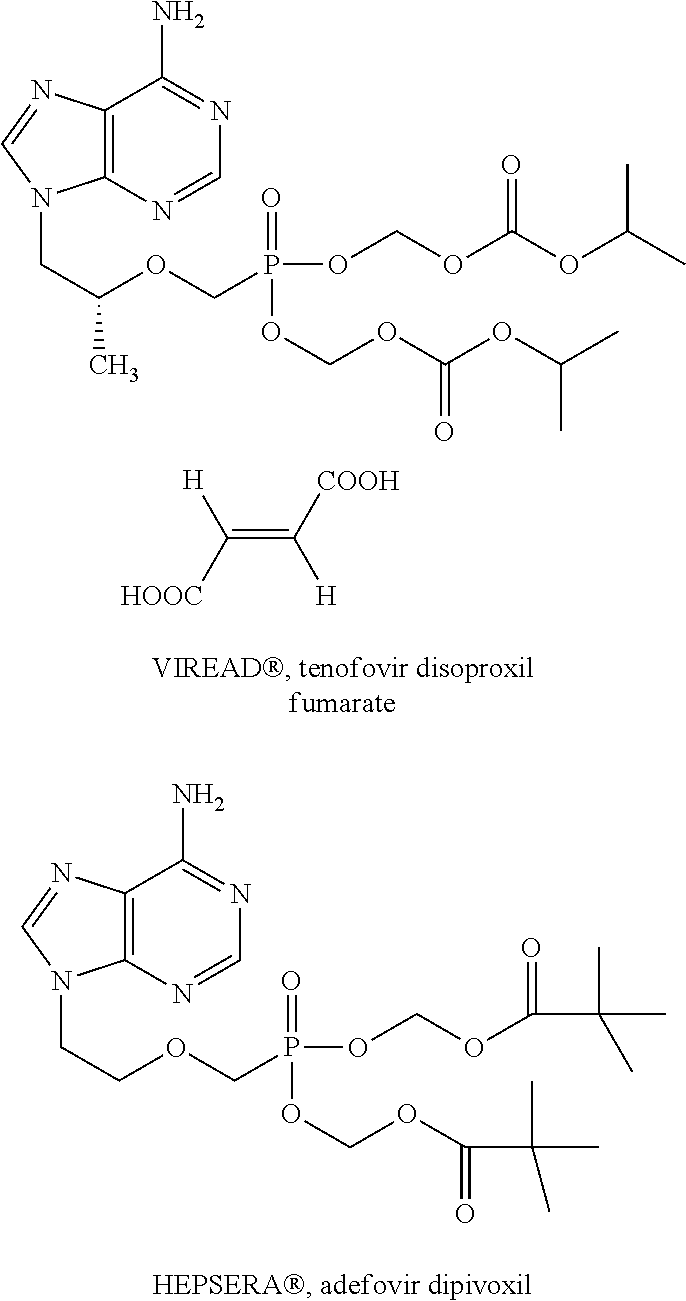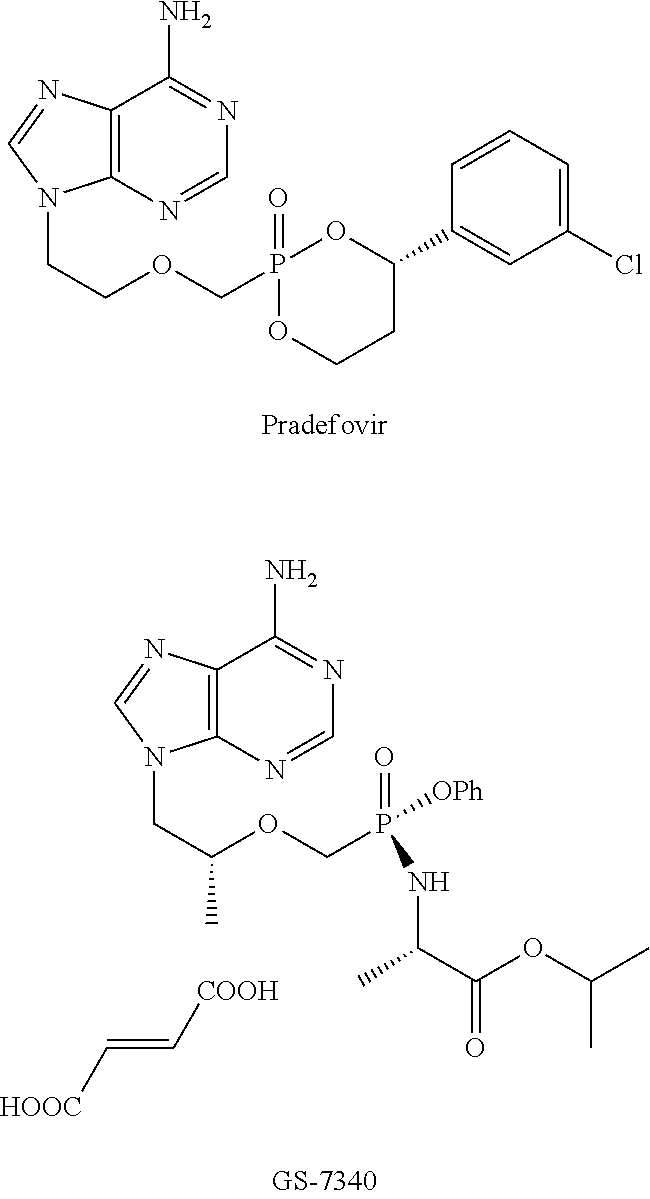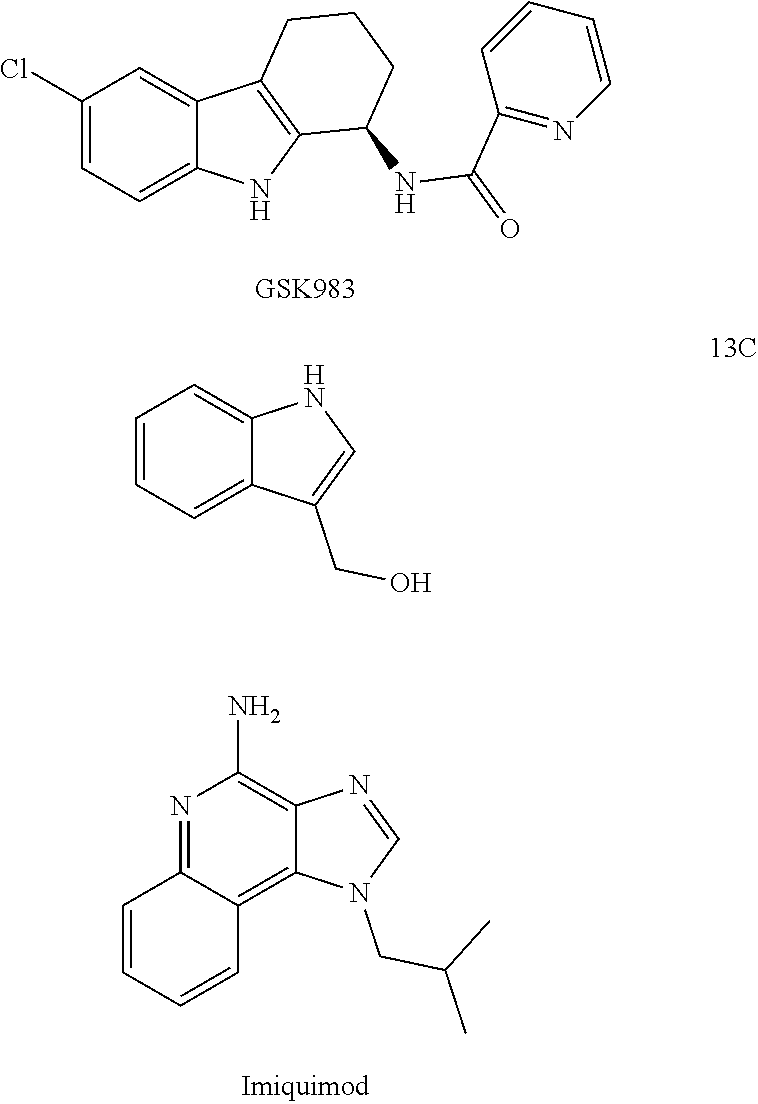Nucleotide analogs
a technology of nucleotide and analog, applied in the field of nucleotide analog, can solve the problems of skin warts, genital warts, respiratory papillomatosis and cancer, and the hpv vaccine may provide little benefit in sexually active women, and achieve the effect of moderating the release rate of active metabolites
- Summary
- Abstract
- Description
- Claims
- Application Information
AI Technical Summary
Benefits of technology
Problems solved by technology
Method used
Image
Examples
example 1.9
Example 1. 9-[(2-phosphonomethoxy)ethyl]-2-amino-6-chloropurine, tributylamine salt (7)
[0203]Compound 6 was prepared as shown in Scheme A and converted to the phosphonic acid (6-a) by treatment with bromotrimethylsilane, followed by hydrolysis. The detailed methods are described in Holy, A. et al. J. Med. Chem. (1999) 42(12):2064-2086. To prepare 7, a 1 L flask was equipped with a magnetic stirrer, a nitrogen inlet, and an addition funnel. Compound 6-a (18.8 g, 61 mmol) and N,N-DMF (200 mL) were added, and the resulting slurry was stirred. Tributylamine (14.9 mL, 62 mmol) was added dropwise over 15-20 mins. The resulting solution was stirred at ambient temperature for 10 mins. Toluene (470 mL) was added, and stirring was continued for 30-40 mins. Seed crystals (50 mg) of compound 7 were added. The mixture was stirred for 5 h, after which the precipitated solids were filtered. The solids were washed with toluene (150 mL) and dried under vacuum for several hours to give 7 (25.6 g, 85%...
example 2.9
Example 2. 9-[(2-phosphonomethoxy)ethyl]guanine (PMEG, 9)
[0204]Compound 9 was prepared by acidic hydrolysis of 6 as shown in Scheme B. Compound 6 (4.95 g, 12.6 mmol) was dissolved in 80% aq. CH3COOH. The mixture was stirred and heated at reflux for 3 h. The mixture was then cooled. The solvent was evaporated under vacuum to give crude 8 as an off-white powder, which was dried in a vacuum oven at 45° C. Compound 8 was dissolved in CH3CN (30 mL), treated with bromotrimethylsilane (11.6 g, 76 mmol) and stirred overnight. The mixture was evaporated under vacuum. Water / crushed ice (50 mL) was added to the residue. The slurry was stirred for 1 h, and the precipitate was collected by filtration to provide 9 (PMEG, 3.1 g, 85% yield). Additional details for preparing PMEG are described in Holy, A. et al. J. Med. Chem. (1999) 42(12):2064-2086.
example 3
oxyethyl PMEG (ODE-PMEG, 11)
[0205]Method A: Compound 11 was prepared by esterification of 7 according to Scheme C. A 1 L flask was equipped with a magnetic stirrer, then compound 7 (21.7 g, 44 mmol), 2-octadecyloxyethanol (ODE-OH, 14.2 g, 45 mmol) and anhydrous N,N-DMF (300 mL) were added. The mixture was stirred and (benzotriazol-1-yloxy)-tripyrrolidinophosphonium hexafluorophosphate (PYBOP®, 35 g, 67.5 mmol) was subdivided in five equal portions (7 g each) and each portion was then added at 30 mins intervals. After the addition of PYBOP®, diisopropylethylamine (DIEA, 5.8 g, 45 mmol) and 1-hydroxybenzotriazole (HOBt, 3.0 g, 22.5 mmol) were added. The resulting mixture was stirred at 22-25° C., and the progress of the reaction was monitored by TLC (70:30:3:3 CHCl3:MeOH:conc. NH4OH:H2O) on silica gel plates (Analtech, UNIPLATES™ Silica gel G, 250 microns). After the reaction was judged complete (16-20 h), the reaction mixture was slowly poured into a stirred acidic mixture comprised ...
PUM
| Property | Measurement | Unit |
|---|---|---|
| structure | aaaaa | aaaaa |
| pharmaceutical composition | aaaaa | aaaaa |
| molecular weight | aaaaa | aaaaa |
Abstract
Description
Claims
Application Information
 Login to View More
Login to View More - R&D
- Intellectual Property
- Life Sciences
- Materials
- Tech Scout
- Unparalleled Data Quality
- Higher Quality Content
- 60% Fewer Hallucinations
Browse by: Latest US Patents, China's latest patents, Technical Efficacy Thesaurus, Application Domain, Technology Topic, Popular Technical Reports.
© 2025 PatSnap. All rights reserved.Legal|Privacy policy|Modern Slavery Act Transparency Statement|Sitemap|About US| Contact US: help@patsnap.com



